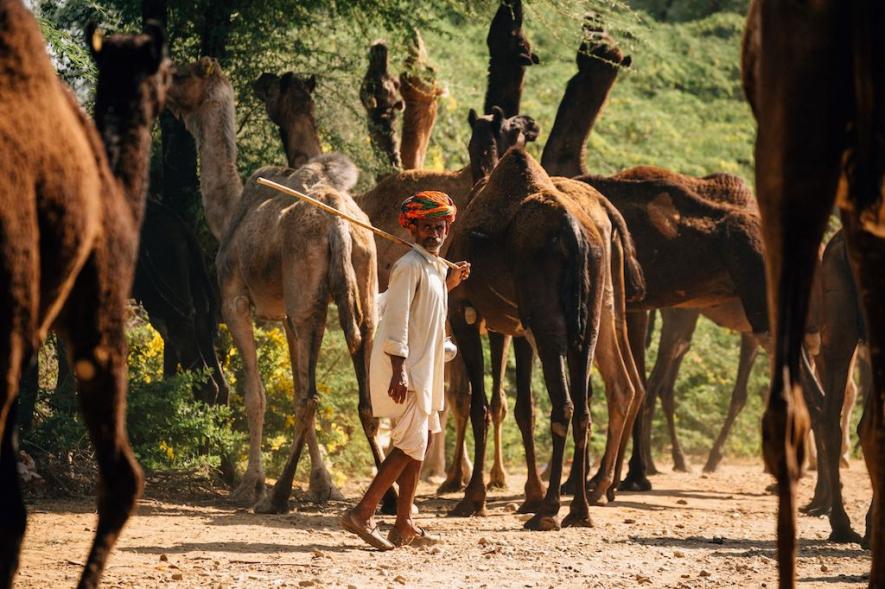Rajasthan Camel Herders Threaten to Leave Animals at District Collectorates

Representational Image/ Photo by Sophie Matterson taken in 2017. This camel herd no longer exists.
In 2014, the camel was declared to be Rajasthan’s state animal. Six years later, camel herders in the state are so hard pressed to fend for their animals that they have written to Chief Minister Ashok Gehlot with a set of five recommendations to make their livelihood more viable. If they get no response before November 26, they say they will leave their camels at district collectorates so the government can take care of them. The letter was sent on November 9, 2020.
On November 26, 10 trade unions have called a nationwide strike to protest against the “anti-farmer, anti-worker and anti-national policies” of the government of Prime Minister Narendra Modi.
In Rajasthan, where the Congress is in power, camel herders say government policy, instead of aiding them, has worked to their detriment. In 2015, the state banned export of camels. The camel population in the state has been in steady decline since, and now stands at less than two lakh – it was about three lakh in 2012.
With that ban, buyers from outside the state no longer arrived at the major camel fairs at Pushkar, Nagaur and Tilwara. Prices of the camel dropped drastically, from over Rs 30,000 each to less than Rs 5,000, making the livelihood of herders hard to sustain. “We can no longer afford to take care of our camels,” the traditional camel herders write to the chief minister.
On October 25, 2020, a meeting of camel breeders was convened at the Lokhit Pashu Palak Sansthan in Pali district. Many breeders reported that although the government had initiated relief for them in 2016 in the form of a grant of Rs 10,000 in three installments for every new-born camel, not many had received this relief – and almost no one had received the final installment.
Also read: Hastinapur Wildlife Sanctuary: Government Proposes Land Reduction, Activists Question Move
The five recommendations made to the chief minister are:
-
Remove the camel export ban: Camels cannot currently be taken out of Rajasthan. This has made male camels not just useless, but also dangerous. Herders can no longer look after grown camels, and they cannot sell them either. In Pakistan, where no such ban exists, the camel population has increased and the male camels are sold for over Rs 1 lakh. Some of these animals are taken to Saudi Arabia, which has a tradition of camel racing. The herders have asked that the ban on export of male camels be lifted, even though the ban on export on female camels can stay.
-
Camel milk is health food; the government must promote consumption: The state government must do much more to promote camel milk as health food, the breeders contend. Mothers of autistic children now seek out camel milk, because it is shown to improve the condition of their children. During the lockdown that came into effect in March, one mother wrote to the Prime Minister seeking help to get the milk for her child, and the railways was pressed into service to keep the supply going. Camels are free-ranging animals and they feed on at least 36 different plant species that are used for making medicines in the Ayurvedic system of medicine. There are dairies in Rajasthan, and even bulk milk coolers. But not enough is being done to promote the consumption of camel milk. Camel milk can be freeze dried and camel milk powder can be sold – this is being done in Gujarat, where Amul now markets camel milk.
-
Camel milk can be supplied to pregnant women and to children in school midday meals: The camel herders have suggested that the state government must formulate schemes to integrate camel milk with the midday meal programme of the state government, where schoolchildren are offered meals in school. Camel milk is also good for women with anemia, and could be supplied to pregnant and lactating women in the state. It is also helpful for those suffering from tuberculosis, and should be used to improve the general health of the state’s population, they have claimed. The Comprehensive National Nutrition Survey last year found that 40% of Rajasthan’s children aged five or less were underweight; 44% were anemic.
-
Allow camel herders access to pasture so animals can graze freely: Camel herders have been disallowed access to land that has fallen within protected areas; even common pasture lands that were earlier accessible to them are harder to access, as there has been encroachment of such spaces and expansion in agriculture in the state. Camels are unique in being large animals that need vast spaces to roam around in – unlike buffalos and cows that can be stall-fed, camels need to walk and graze freely. The animal dung serves to disseminate seeds and fertilize soil; camels also only nibble a little at a time, so it is not like they damage the vegetation that they feed on. In any case, these are fit matters for research, the breeders say in their letter to the chief minister.
-
Use Rajasthan Tourism too to promote camel products: Camel milk, cheese and wool can all be promoted to tourists visiting the state. The state tourism department can do much more to promote camel products, the herders state.
Last year, herders and members of civil society had met officials of the state animal husbandry department seeking amendments to the 2015 Act, which allows euthanasia of ailing camels and also permits export for breeders and for other special reasons. Hanwant Singh Rathore, who has been working for over two decades with camel herders in Pali district said, “We have been interacting with government officials, and the staff at the animal husbandry department is sympathetic and agrees that our concerns are valid. Even so, there is little progress in our conversations with the government, and we are now pushed to the wall.”
Till about a decade ago, many foreign tourists would arrive in Rajasthan and head off into the desert in camel safaris, erecting tents in the dunes of Jaisalmer and listening to the music of Manganiyar musicians or gazing at the starry desert skies. The large number of windmills in the Jaisalmer desert have put paid to camel caravans – the windmills glow with lights by night, and the desert sky is no longer merely starlit at night. This has eroded the tourism income of camel owners.
Officials in the departments of animal husbandry and tourism of the state government could not be contacted on phone for a response to these demands.
The writer is an independent journalist based in Rajasthan.
Get the latest reports & analysis with people's perspective on Protests, movements & deep analytical videos, discussions of the current affairs in your Telegram app. Subscribe to NewsClick's Telegram channel & get Real-Time updates on stories, as they get published on our website.














